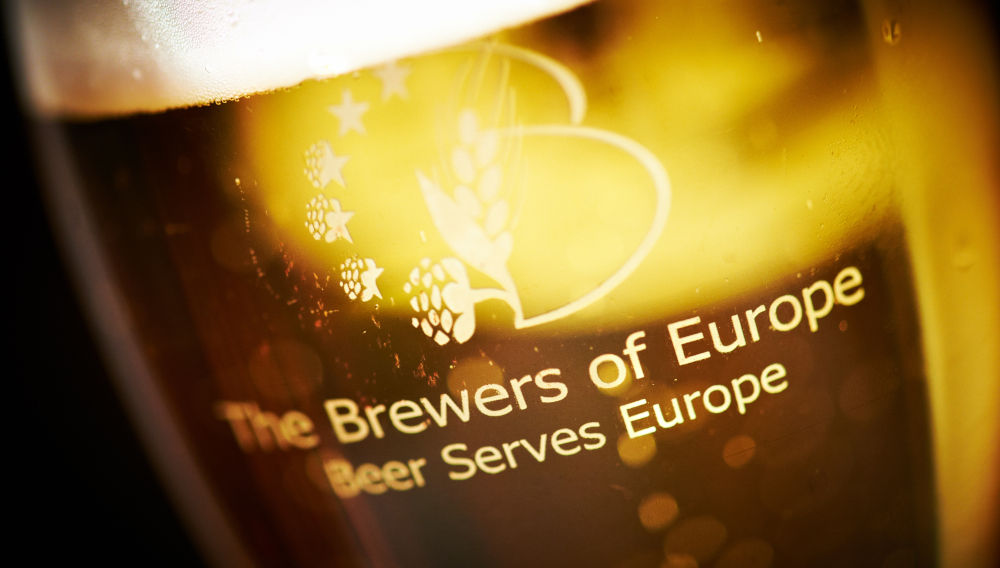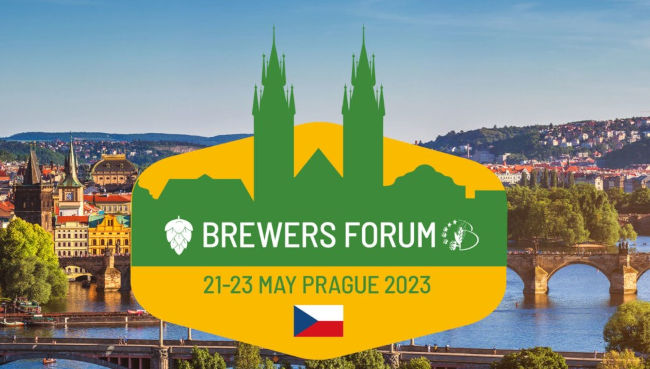Brewers Forum in Prague: think positive
Czech Republic | It was a good decision to make Prague the host of the 5th edition of the Brewers Forum (21-23 May). No central European city had ever put on a Forum before. Previous Forums were held in Brussels, Antwerp and Madrid, plus one online during the pandemic. The organisers, the Brewers of Europe, an industry body, wanted to show their support for the Czech Association of Breweries and Malt Houses (ČSPS). In 2022, they applied to get Czech beer culture added to UNESCO’s intangible cultural heritage list.
The 600 or so Czech brewers are fairly optimistic about their chances, even though it may take years before a decision is taken. They will not be the first to have their brewing tradition catalogued by UNESCO. Belgium beat them to it, in 2016.
This being Europe, the usual naysayers will argue that Belgium’s UNESCO listing has done little for domestic beer consumption. It has nearly halved since the 1990s to below 70 l in 2020. Although Czechs on average drink the most beer in Europe (121 l in 2021), total domestic consumption in 2022 still fell 1 million hl short of pre-covid levels.
The UNESCO listing is undoubtedly an honour, but it must not be used for commercial, marketing purposes. Nevertheless, it could provide a sense of identity to the Czech brewing industry, and possibly prevent future governments from implementing legislation which will harm the nation’s brewers collectively.
Everyone for himself?
The Czech brewing industry finds itself in a quandary similar to its European peers. It may boast a venerable brewing tradition, but it needs to attract current and future consumers that are spoilt for drinking choices. While many brewers in Europe share this predicament, they appear more concerned with national issues than with larger, European, or industry-wide ones.
The Brewers of Europe, through their national associations, represent some 10,000 breweries. So why did the Forum only draw some 600 delegates this year, including quite a number of delegates from the supply industries? From the start, the Forum also wanted to be inclusive in the sense of bringing microbreweries into the fold. But where were they? Probably busy brewing beer for the summer season, some delegates guessed.
Although the EU has 27 member states, there is little evidence of a European consciousness yet. Europe, or Brussels, is still seen by many as a meddler, putting obstacles in their way rather than easing ways of doing business. It was Ivan Stefanec, a Slovak member of the European Parliament, who was given the thankless task of reminding delegates of the many challenges they face: among the ones he mentioned were the war in Ukraine, the to-be-revised EU packaging directive (which could make billions of refillable beer bottles obsolete) and Ireland’s recent alcohol labelling law, which, if not modified by the World Trade Organization, could become a dangerous precedent for more cigarette-style warnings on beer bottles across the continent.
Look on the bright side
Luckily, Paolo Lanzerotti, CEO of Asahi International, and Gavin Hattersley, CEO of Molson Coors (Molson Coors owns Staropramen brewery), who used to be former colleagues at SABMiller and now find themselves as competitors, managed to deliver an upbeat message. They referred to the industry’s various achievements in terms of sustainability (“We have moved forward”, Mr Lanzarotti said) and “moderation through self-regulation” (Mr Hattersley).
Whether their promises of “we can move faster” are indicative of a general industry-wide optimism, only time will tell. Some delegates were not so sure. What Europe lacks, they said, is a positive narrative on beer. In the face of declining consumption, it could inspire consumers (akin to craft beer in the US) so that they will make an “emotional purchase” (the beer writer Pete Brown).
Unlike in Madrid last year, where sustainability was dealt with even in the non-tech sessions, there was no single topic which dominated the programme this year. It is not as if sustainability issues have been ticked off by all already. Being part of the “Brussels circus” (no offence), the organisers would have known that the big, stockmarket-listed brewers have gone somewhat quiet on their climate commitments. This tactic, known as “green-hushing”, was adopted because corporate environmental, social and governance (ESG) responsibilities have since become politically contentious in the United States.
The elephant in the room
Numerous, Republican-run states have implemented restrictions on using ESG factors for publicly invested assets. The EU is not worried about wokeness. In fact, it is touting its Green Deal. But the Big Brewers, who also do business in the US, probably do not want to be seen too keen on pushing this agenda, as it might frighten some of their investors.
Alas, by steering away from any controversial issues, the programme for the non-tech sessions seemed a bit arbitrary. Besides, who still needs to be told how important glassware, non-alcoholic beer or branding are? Even a great session with the English beer writer Pete Brown on craft beer – his book “Craft: an argument” is the best on this topic – felt nostalgic. Mr Brown necessarily revisited the battles over “independence”, which were decided about a decade ago.
In most parts of Europe, craft beer has arrived and settled into a niche. It certainly no longer dominates the beer discourse. The Czech brewers actually conceded that they have failed to take advantage of the craft beer razzmatazz. “We don’t think of Czech lagers as craft beer because they are old styles,” one admitted. Worse still, few have managed to take advantage of craft beer’s higher price points to premiumise their own portfolios, as the Big Brewers did in the United States.
The tyranny of beer rating websites
However, there were sessions on the programme, which looked innocuous to start with but turned out to be quite provocative. One of these sessions was devoted to beer styles. Two presenters – Jan Lichota, a lawyer, and André Brunnsberg, President of the European Beer Consumers Union – were critical of the proliferation of beer styles. The list, most brewers refer to, is the GABF’s, which already sports 98 categories and 212 styles.
Although these style directories are meant to educate consumers, they rather tend to confuse them or literally drive them away (in Finland, for example). Who can distinguish between a Double IPA and an Imperial IPA? And who can tell apart a marketing gimmick from a true style innovation? Brewers themselves add to the confusion, we heard. When entering into a beer competition, many prefer to create their own styles rather than try to beat the category leader.
The tyranny of influential beer communities – eg the rating website untappd - was also mentioned. The Czechs complained that their Pilsner beers cannot get a favourable, higher rating because the beer geeks favour more in-your-face styles. Marius Mirecea, who co-owns the Romanian craft brewer, Clinica de Bere, advised that craft brewers need their own “forgiving community” – online and in the market – to “counter the haters”, should a beer not turn out quite as expected.
The French beer sommelier, Marie-Emmanuelle Berah, spoke out in favour of clearer beer descriptions for consumers, which do not use difficult language. However, when she presented her suggestions for indicating alcohol content on a label, there was a sharp intake of breath in the audience: lower alcohol content was compared to an upright graphic figure, whereas high alcohol content shows the figure lying on the ground.
Too many beer competitions?
The other session, which looked innocuous enough but became political, was on beer competitions. As with beer styles, there are probably far too many beer competitions, Luc de Raedemaeker, Director of the Brussels Beer Challenge, self-critically admitted. While a medal at a competition can boost sales, many brewers do not submit their beers, as this will not help their story. The Trappiest brewery Westmalle, a famous abstainer from competitions, is considered the world’s best in its category anyway. Others, like Spanish brewer Mahou San Miguel, enter into some 80 competitions annually and take home quite a few medals too. However, they do not use them much except in PR as marketing for their big brands revolves around other issues.
What is worrying Mr Raedemaeker is that he is finding it increasingly difficult to elicit support from city councils where he hosts his tastings. “Councillors don’t want to give public money to alcohol events,” he said. And he wondered about the sustainability of it all, if you “fly in judges from China to judge Chinese beers?” In the end, the audience could not fail but spot a disconnect between the Big Brewers, who sell big brands, and craft brewers, who sell beers to well-informed aficionados. “No one teaches consumers about what beer is,” one delegate remarked dryly.
The 6th Brewers Forum will be held in Lille, France, from 26 to 30 May 2024, in conjunction with the 39th EBC Congress.


